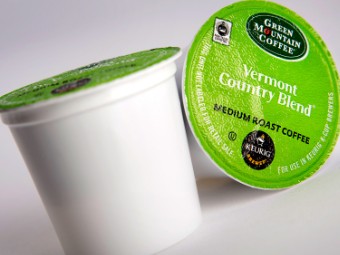
As I discussed in my previous episode on plastics in food although BPA is the chemical thats gotten all the press Im not at all confident that BPA-free plastics are totally without risk. This option would divert plastic and K-Cup waste in the landfills completely.

K-cups do not contain BPA.
K cups not plastic. The K cups are a mix of plastic with a foil top and are neither recyclable nor compostable unless you took the 9-11 grams out of every k cup and put it in the compost pile. According to SPI Guidelines the plastic would be labeled a 7 which is a catch-all category for. Most notably they have introduced pods made with polypropylene 5 plastic which the company notes is widely recyclable curbside throughout North America These are now the only K-Cups.
SF Bay Coffee OneCUP Organic Rainforest Blend 80 Ct Medium Roast Compostable Coffee Pods K Cup Compatible including Keurig 20 Packaging May Vary 80. Nespresso pods are typically made from aluminum not plastic. These Nespresso pods are only recyclable at special drop off points not at home.
Fortunately there are some brands making recyclable Nespresso pods that can be put in your recycling bin. One brand using recyclable materials is. And because the K-Cup is made of that plastic integrated with a filter grounds and a plastic-foil top there is no easy way to separate the components for recycling.
Afterward the cup goes into the trash. No muss no fuss. The problem is that these little cups are made out of plastic–BPA-free but plastic all the same.
As I discussed in my previous episode on plastics in food although BPA is the chemical thats gotten all the press Im not at all confident that BPA-free plastics are totally without risk. Nothing is more emblematic of this culture shift and waste problem than Keurig Green Mountain companys plastic single serve K-cups. Designed specifically for the Keurig brand coffee brewer these white plastic pods with aluminum foil lids create a single cup of coffee with the press of a button.
Although there are options to use Keurig cups that can be recycled the vast majority of cups being sold are still of the plastic variant. What is alarming is that Keurig claims the composition of these cups are 7 plastic which is an unknown proprietary composition. K-cups do have recyclable parts.
The company changed the plastic it uses in its cups from number 7 a blend of other plastics which cannot be recycled to number 5 plastc Prolypropylene which many recycling facilities process. So in theory these cups can be shredded and recycled. However the cups are not easy to recycle.
The science is not there. K-cups do not contain BPA. K-cups are likely no more dangerous than those plastic tops you put on your disposable coffee cup.
Even reusable coffee mugs are often plastic based and also dont contain BPA. In terms of filling up landfills the trash from a kcup is far less than the coffee cup at any Starbucks like place. K-Cup and Vue packs do not contain BPA and are constructed using FDA-approved food safe materials.
We also use FDA-approved food safe materials in our K-Cup and Vue brewing systems and neither system contains BPA within its water paths as of January 1 2010 for our K-Cup system. Brewing coffee involves both heat and acid. In early 2016 the New York Times reported on Keurigs annoucement that they would finally be coming out with a K-Cup made of plastic recyclable by typical municipal facilities.
Yusen confirmed that the 7 plastic used in K-Cups is BPA-free safe and meets or exceeds applicable FDA standards But new evidence suggests that even non-BPA plastics. All of the companys K-Cup pods sold in Canada are recyclable as of the end of 2018 and we are just beginning to introduce our new recyclable pods in the US. More broadly Keurig said.
K-Cups have been confirmed to be BPA-free and made of safe plastic but some studies show that even this type of material can have harmful effects when. The most common way to reduce K-Cup pollution is to purchase a reusable K-Cup. All you have to do is empty it and refill it with your favorite coffee.
This option would divert plastic and K-Cup waste in the landfills completely. Recycling doesnt have to.